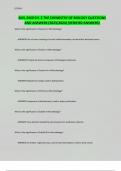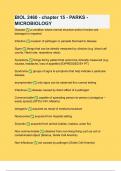Biol 246 - Study guides, Class notes & Summaries
Looking for the best study guides, study notes and summaries about Biol 246? On this page you'll find 75 study documents about Biol 246.
Page 2 out of 75 results
Sort by
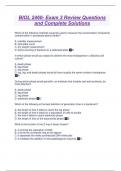
-
BIOL 2460- Exam 3 Review Questions and Complete Solutions
- Exam (elaborations) • 14 pages • 2024
- Available in package deal
-
- $9.49
- + learn more
Which of the following methods would be used to measure the concentration of bacterial contamination in processed peanut butter? A. turbidity measurement B. total plate count C. dry weight measurement D. direct counting of bacteria on a calibrated slide B In which phase would you expect to observe the most endospores in a Bacillus cell culture? A. death phase B. lag phase C. log phase D. log, lag, and death phases would all have roughly the same number of endopores A During which phase would...
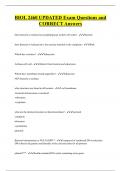
-
BIOL 2460 UPDATED Exam Questions and CORRECT Answers
- Exam (elaborations) • 34 pages • 2024
-
- $9.49
- + learn more
Does bacteria or archaea have peptidoglycan in their cell walls? - bacteria does Bacteria or Archaea have free nuclear material in the cytoplasm - Both Which has a nucleus? - Eukaryotes Archaea cell wall - distinct from bacteria and eukaryotes Which have membrane-bound organelles? - Eukaryotes NOT-bacteria or archaea what structures are found in all bacteria - -cell membrane -bacterial chromosome or nucleoid
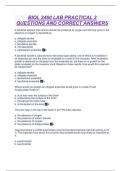
-
BIOL 2460 LAB PRACTICAL 2 QUESTIONS AND CORRECT ANSWERS
- Exam (elaborations) • 7 pages • 2024
- Available in package deal
-
- $8.99
- + learn more
A bacterial species that cannot tolerate the presence of oxygen and will only grow in the absence of oxygen is classified as a. obligate aerobe b. obligate anaerobe c. facultative aerobe d. mcroaerophile e. aerotolerant anaerobe b A bacterial isolate is subcultured to two blood agar plates, one of which is incubated in an anaerobe jar, and the other is incubated on a shelf in the incubator. After incubation, growth is observed on the plate from the anaerobe jar, but there is no growth on the p...
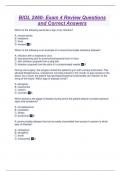
-
BIOL 2460- Exam 4 Review Questions and Correct Answers
- Exam (elaborations) • 7 pages • 2024
- Available in package deal
-
- $8.99
- + learn more
Which of the following would be a sign of an infection? A. muscle aches B. headache C. fever D. nausea C Which of the following is an example of a noncommunicable infectious disease? A. infection with a respiratory virus B. food poisoning due to a performed bacterial toxin in food C. skin infection acquired from a dog bite D. infection acquired from the stick of a contaminated needle B During oral surgery, the surgeon nicked the patient's gum with a sharp instrument. This allowed Streptococ...
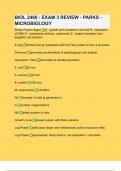
-
BIOL 2460 - EXAM 3 REVIEW - PARKS - MICROBIOLOGY
- Exam (elaborations) • 19 pages • 2024
- Available in package deal
-
- $7.99
- + learn more
BIOL 2460 - EXAM 3 REVIEW - PARKS - MICROBIOLOGY
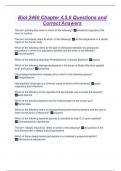
-
Biol 2460 Chapter 4,5,6 Questions and Correct Answers
- Exam (elaborations) • 6 pages • 2024
- Available in package deal
-
- $8.99
- + learn more
The term prokaryotes refers to which of the following? unicellular organisms that have no nucleus The term microbiota refers to which of the following? all microorganisms in a certain region of the human body Which of the following refers to the type of interaction between two prokaryotic populations in which one population benefits and the other is not affected? commensalism Which of the following describes Proteobacteria in domain Bacteria? phylum Which of the following Alphaproteobacteria...
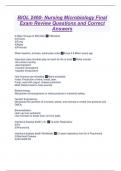
-
BIOL 2460- Nursing Microbiology Final Exam Review Questions and Correct Answers
- Exam (elaborations) • 7 pages • 2024
- Available in package deal
-
- $8.49
- + learn more
5 Major Groups of Microbes 1)Bacteria 2)Viruses 3)Fungi 4)Algae 5)Protozoa When bacteria, archaea, eukaryotes arise Arose 2.9 Billion years ago Important roles microbes play on earth for life to exist Roles include: -life-nutrient cycling -decomposition -maintain atmosphere -regulate tempurature How humans use microbes Many examples: Yeast: Production of wine, bread, beer. Fungi: used with yogurt, cheese production Mold: Moldy bread to treat wounds. Biotechnology: M...
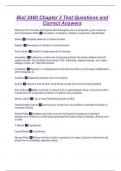
-
Biol 2460 Chapter 3 Test Questions and Correct Answers
- Exam (elaborations) • 6 pages • 2024
- Available in package deal
-
- $8.99
- + learn more
What are the five basic techniques Microbiologists use to manipulate, grow, examine, and characterize MOs Inoculation; Incubation; Isolation; Inspection; Identification Sterile Complete absence of viable microbe Aspetic Prevention of infection or contamination Pure culture Growth of single species of microbe Inoculation Producing a culture by introducing sample into sterile medium that will sustain growth. Can be taken from blood, CSF, discharge, disease tissues, soil, water, sewage, foods, ...
BIOL 2460 CH. 2 THE CHEMISTRY OF BIOLOGY QUESTIONS AND ANSWERS (2023/2024) (VERIFIED ANSWERS)
BIOL 2460 - chapter 15 - PARKS - MICROBIOLOGY with Verified Correct Answers

That summary you just bought made someone very happy. Also get paid weekly? Sell your study resources on Stuvia! Discover all about earning on Stuvia



